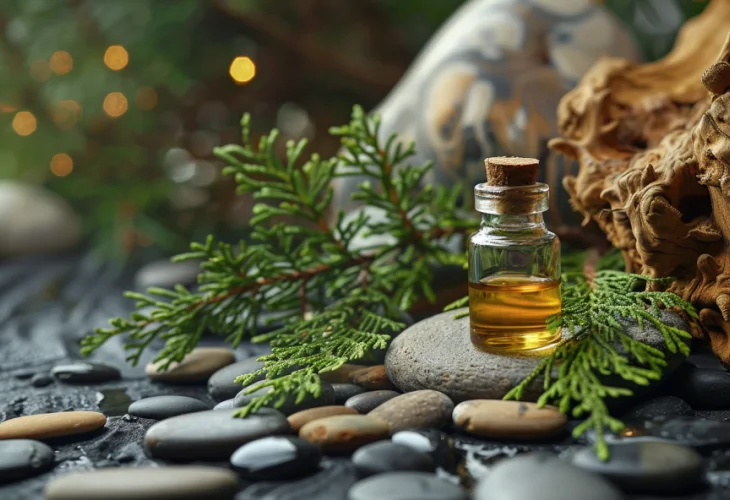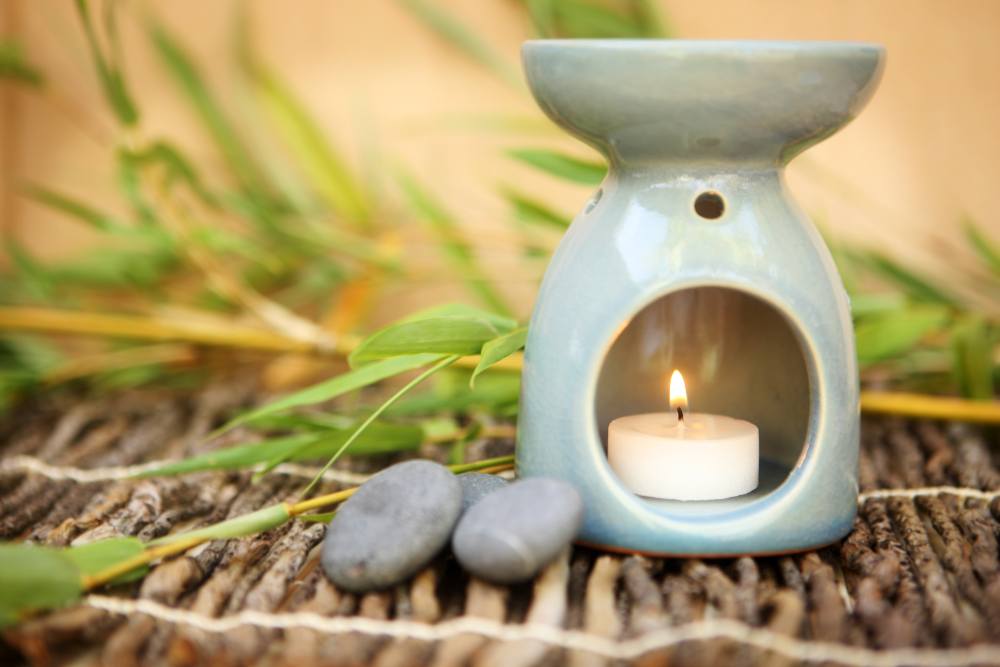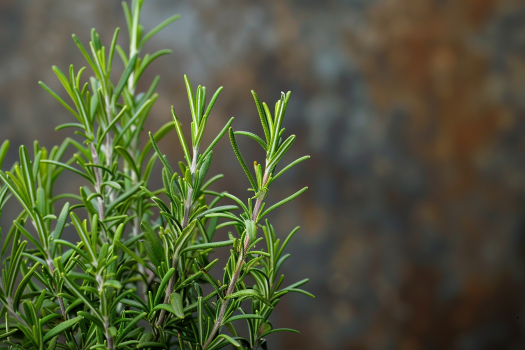Essential Oils: A Modern Approach to Health and Wellness
Discover the power of essential oils for relaxation, stress reduction, enhanced immune function, and purifying air. Learn how to easily incorporate them into your daily life and which oils are recommended for this season.

Aromatherapy, or therapy through scents, is a natural treatment method using essential oils derived from various plants to enhance our physical and mental health. These essential oils contain the concentrated essence of the plant and offer a wide range of healing properties.
You can use essential oils in various ways, like diffusing the scents through burners, using steam bowls, applying them to the skin with a carrier oil, or adding them to a bath.
Each oil has its own unique benefits. Oils like lavender, chamomile, and ylang-ylang are known for calming the mind and reducing stress and anxiety. Oils such as orange, lemon, and bergamot are recognized for their refreshing and invigorating properties. Peppermint, eucalyptus, and rosemary oils have anti-inflammatory properties and can relieve muscle and joint pain, headaches, and skin inflammations. Tea tree and eucalyptus oils can help prevent infectious diseases and strengthen the immune system. For those suffering from insomnia, lavender and chamomile oils will help calm and improve sleep quality.
What is an Essential Oil?
Essential oils are concentrated extracts distilled or cold-pressed from various plants. They contain the fragrance and active compounds of the plant from which they are derived and are used for natural treatment of various physical and mental health issues.
 Aromatic oil burner
Aromatic oil burnerHow to Choose a Quality Essential Oil?
Choosing a quality essential oil is important to ensure the effectiveness of the treatment. It is crucial to ensure that the oil is natural and pure, without any chemical additives. It is also advisable to check the oil's source and ensure that the manufacturer uses processes that preserve the product's quality. Furthermore, it is important to purchase oils in dark glass containers to prevent light exposure, which can degrade the oil's quality.
How to Use Essential Oils?
There are several ways to use essential oils, but for any skin contact—it's important to consult a professional. This is because essential oil use requires proper dilution with a carrier oil. Moreover, pregnant or breastfeeding women, children, and individuals with chronic illnesses must consult a doctor or an aromatherapy expert before using essential oils.
In this article, we'll discuss using a burner and inhalation, simple methods for integrating essential oils into daily life. To use a burner, add water to the burner's bowl and drip 3-5 drops of essential oil. Light the candle beneath the bowl to heat the water and diffuse the wonderful scents throughout the room.
Recommended Essential Oils for Burner Use
A popular way to benefit from the healing and relaxing aroma of oils is using a burner. If you don't want to leave a burning candle in a room, you can use a small jar with coarse salt and drip the oils over it. Here is a list of some of the most recommended oils for burner use:
1. Lavender (Lavandula angustifolia)
- Calms and balances the nervous system.
- Improves sleep quality.
- Relieves stress and anxiety.
Lavender essential oil is known for its calming and stress-reducing capabilities. The vapors rising from the burner will help calm the mind and prepare the body for a good night's sleep. It's an excellent oil for bedrooms or places where complete relaxation is needed.

2. Patchouli (Pogostemon cablin)
- Anti-inflammatory.
- Stimulates the immune system.
- Calms the spirit.
Patchouli oil has an earthy scent and helps balance emotions and reduce anxiety. Using it in a burner creates a warm and calming atmosphere, making it a great choice for times when you want to relax and unwind.
3. Bergamot (Citrus bergamia)
- Refreshes and uplifts mood.
- Anti-inflammatory.
- Simultaneously invigorates and calms. Reduces fatigue.
Bergamot oil elevates mood and provides a sense of freshness. The aromatic vapors improve overall feeling and reduce stress. Using it in a living room or workspace can enhance the general atmosphere and energize those present.
4. Eucalyptus (Eucalyptus globulus)
- Improves breathing.
- Antibacterial and antiviral.
- Refreshes and purifies the air.
Eucalyptus essential oil is excellent during cold or flu seasons. The vapors from the burner cleanse the air, ease breathing, and help prevent illnesses. It's recommended for use in living areas, especially during winter.
5. Rosemary (Rosmarinus officinalis)
- Improves concentration and memory.
- Stimulates blood circulation.
- Anti-inflammatory.
Rosemary oil is known for enhancing focus and sharpening the mind. Using this oil can boost cognitive performance and increase alertness, making it ideal for work or study spaces. The refreshing scent helps create a productive work environment.
6. Frankincense (Boswellia carterii)
- Calms and deepens breathing.
- Anti-inflammatory and boosts the immune system.
- Promotes spirituality and peace.
Frankincense oil induces a sense of calm and deep peace, perfect for solitude. Its use creates a serene and uplifting atmosphere, making it an excellent choice for meditation rooms or places requiring mental tranquillity.
7. Peppermint (Mentha piperita)
- Refreshing and invigorating.
- Improves breathing and alleviates headaches.
- Antibacterial.
Peppermint oil is known for its energizing and refreshing effects. The vapors from the burner enhance breathing and alleviate headaches. It's an excellent oil for morning use or places requiring alertness and freshness.
Essential Oils for Inhalation
Inhaling essential oils is a simple and effective way to enjoy their benefits. Simply drip a few drops onto a tissue or cloth and inhale.
Here is a list of recommended essential oils for inhalation:
1. Lavender (Lavandula angustifolia)
- Calms and reduces stress and anxiety.
- Improves sleep quality.
- Relieves headaches.
2. Peppermint (Mentha piperita)
- Refreshing and invigorating.
- Alleviates headaches and nausea.
- Improves concentration and alertness.
3. Eucalyptus (Eucalyptus globulus)
- Eases breathing and aids in respiratory conditions.
- Antibacterial.
- Refreshes and cleanses the air.
4. Lemon (Citrus limon)
- Refreshing and elevates mood.
- Strengthens the immune system.
- Energizes and reduces fatigue.
5. Rosemary (Rosmarinus officinalis)
- Stimulates and enhances concentration and alertness.
- Improves memory.
- Anti-inflammatory.

6. Ylang Ylang (Cananga odorata)
- Calms and reduces anxiety.
- Enhances mood.
- Stimulates positive emotions.
7. Sweet Orange (Citrus sinensis)
- Refreshes and elevates mood.
- Calms and reduces stress.
- Strengthens the immune system.
Tips for Safe Use of Oils:
- Avoid direct contact of the oil with your eyes.
- Pay attention to quality. Use pure and high-quality essential oils from reliable sources.
- Start with gentle oils. Oils like lavender, chamomile, and rosemary are considered gentler and less likely to cause allergic reactions when they come into contact with the skin. In contrast, oils like cinnamon, clove, and oregano are stronger and may irritate skin even when diluted.
- If you have a history of allergies or sensitive skin, it is advisable to consult a doctor or aromatherapy expert before using essential oils.
Inhaling essential oils is an easy and effective way to enhance health and overall well-being. The recommended oils mentioned can assist in a variety of situations, from boosting mood to alleviating physical symptoms. Use them wisely, and you can enjoy their benefits easily.
* The content of this channel does not constitute professional advice, recommendation, or a substitute for consulting a specialist or obtaining medical advice.

